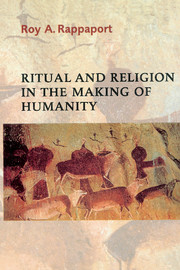Book contents
- Frontmatter
- Contents
- Foreword
- Preface
- 1 Introduction
- 2 The ritual form
- 3 Self-referential messages
- 4 Enactments of meaning
- 5 Word and act, form and substance
- 6 Time and liturgical order
- 7 Intervals, eternity, and communitas
- 8 Simultaneity and hierarchy
- 9 The idea of the sacred
- 10 Sanctification
- 11 Truth and order
- 12 The numinous, the Holy, and the divine
- 13 Religion in adaptation
- 14 The breaking of the Holy and its salvation
- Notes
- References
- Index
- Cambridge Studies in Social and Cultural Anthropology
13 - Religion in adaptation
Published online by Cambridge University Press: 05 June 2012
- Frontmatter
- Contents
- Foreword
- Preface
- 1 Introduction
- 2 The ritual form
- 3 Self-referential messages
- 4 Enactments of meaning
- 5 Word and act, form and substance
- 6 Time and liturgical order
- 7 Intervals, eternity, and communitas
- 8 Simultaneity and hierarchy
- 9 The idea of the sacred
- 10 Sanctification
- 11 Truth and order
- 12 The numinous, the Holy, and the divine
- 13 Religion in adaptation
- 14 The breaking of the Holy and its salvation
- Notes
- References
- Index
- Cambridge Studies in Social and Cultural Anthropology
Summary
The concerns of this book, it was announced in a near-chiasmus in its first sentence, are two: to consider the nature of religion and to explore the place of religion in nature. The second sentence declared that it is, therefore, concerned with the very nature of humanity.
The very word “human” points to the dual nature of our species. On the one hand, it is cognate with “humus,” reminding us (as does the relationship of the Hebrew adamah, earth, to adam, man) of humanity's “natural nature,” of what humanity has in common with all living things. Humans are no less of the earth than the earthworms that will eventually return them to the earth from which the myths of many peoples tell them they first sprang. On the other hand, “human” is as clearly and closely related to the Latin humanitas and humanus, denoting kindness, sympathy, philanthropy, politeness, refinement, civilization (C. Lewis 1891), all that presumably distinguishes humanity from the rest of life. Both humus and humanitas: humanity is a species that lives and can only live in terms of meanings it itself must fabricate in a world devoid of intrinsic meaning but subject to natural law. Humanity is not, as Geertz (1973) would have it, simply “suspended in webs of meaning.” It is caught between natural laws that it never fully comprehends and meanings that it must fabricate in the absence of much to prevent it from constructing self-destructive or even world-destroying follies.
- Type
- Chapter
- Information
- Ritual and Religion in the Making of Humanity , pp. 406 - 437Publisher: Cambridge University PressPrint publication year: 1999

